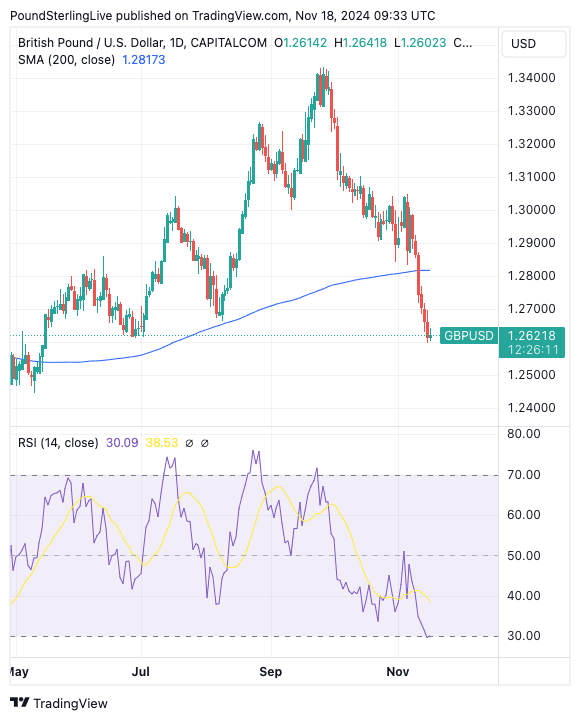Pound to Dollar Week Ahead Forecast: Fade the Trump Trade
- Written by: Gary Howes

Image © Adobe Images
Pound Sterling has come under notable pressure against the Dollar as markets prepare for the second Trump administration, but we think relief is in store this week.
The Pound to Dollar exchange rate (GBP/USD) selloff has reached oversold conditions, as per the Relative Strength Index (RSI), which is now at 30.
A reading of 30 and below indicates that an asset is oversold and that a reversal must occur. This could involve either a period of consolidation or a recovery.
These oversold conditions, combined with the broader sense that the 'Trump trade' is due a breather, suggest that GBP/USD could record a modest weekly gain.
GBP to USD Transfer Savings Calculator
How much are you sending from pounds to dollars?
Your potential USD savings on this GBP transfer:
$1,702
By using specialist providers vs high street banks
GBP/USD has fallen for seven weeks in succession, and the trend is negative.
The pair last week sliced below the 200-day moving average, which serves as an official signal that the trend has flipped from bullish to bearish on a multi-week basis.
Given this, any strength will likely be shallow and there remains a real risk that it could invite USD buyers to reload ahead of another leg lower in GBP/USD.
Above: GBP/USD has fallen below the 200-day moving average, but the RSI is oversold (lower panel).
The sharp decline in GBP/USD reflects a realisation that the U.S. Federal Reserve won't cut interest rates by nearly as much as was the base-case expectation in the summer months, ensuring a significant readjustment in expectations in the USD's favour.
Underpinning the view is the U.S. economy's ongoing outperformance against others and expectations for inflation to remain above the 2.0% target for an extended period. A driver of this expectation is Trump's desire to raise import tariffs and cut taxes.
Trump has made a series of controversial appointments to his top team, which has signalled that the administration intends to make as much progress as soon as possible, unlike during his first term.
The Dollar's post-election surge reflects a market getting ahead of the agenda.
🎯 GBP/USD year-ahead forecast: Consensus targets from our survey of over 30 investment bank projections. Request your copy.
But, the risk is that the market has gone a bit too far, and investors might want to see some real statements regarding policy, to flesh out the reality.
In the absence of such a development, the space grows for the market to cover recent USD strength.
Regarding event risk, UK inflation data is due for release on Wednesday.
UK inflation is expected to have risen to 2.2% year-on-year in October from 1.7% in September, indicating an acceleration in inflation.
Economists at the Bank of England and the Office for Budget Responsibility recently upgraded their forecasts for the near term in the wake of the October budget, which saw the government announce a big increase in spending.
Also, household energy prices are rising again, so the easy part of the 2024 deflationary process is now behind us.
Core inflation is expected to remain at a sticky 3.2%, driven by strong services inflation. If these figures come in weaker, the pound could come under pressure, as this would open the door to a potential Bank of England interest rate cut in December.
"The services rate is set to remain hovering close to 5% y/y. A significant downside surprise would be needed to meaningfully boost the likelihood of a December rate cut," says Sam Hill, Head of Market Insights at Lloyds Bank.
Should inflation beat expectations, the Pound-Dollar exchange rate could well rally back to its recent highs as investors reinforce expectations that the Bank of England will only be able to cut at a quarterly pace in 2025, meaning just four further rate cuts are likely.
We are particularly interested in the UK's PMI data, due on Friday, as they should incorporate the fallout from the October budget.
There are reports that business sentiment and hiring intentions took a hit following the budget, and this could be reflected in a poor PMI reading. If this is the case, the Pound-Euro exchange rate could close in the red for the second consecutive week.
"In the two weeks since the budget, various big names in the UK retail and hospitality sector have warned that Reeve’s hike to employers’ national insurance contributions would led to a jump of costs to consumers. Others have indicated that it could lead to job losses," says Jane Foley, Senior FX Strategist at Rabobank.
The Bank of England could well respond to signs of a slowing economy by cutting interest rates again next month, judging that it can cut rates further without stoking inflation. It would suggest that the Bank thinks that if growth is allowed to collapse, then inflation would drastically undershoot current expectations in 2025-2026.
Any signs that it will accelerate the rate cutting process would weigh on the Pound.






